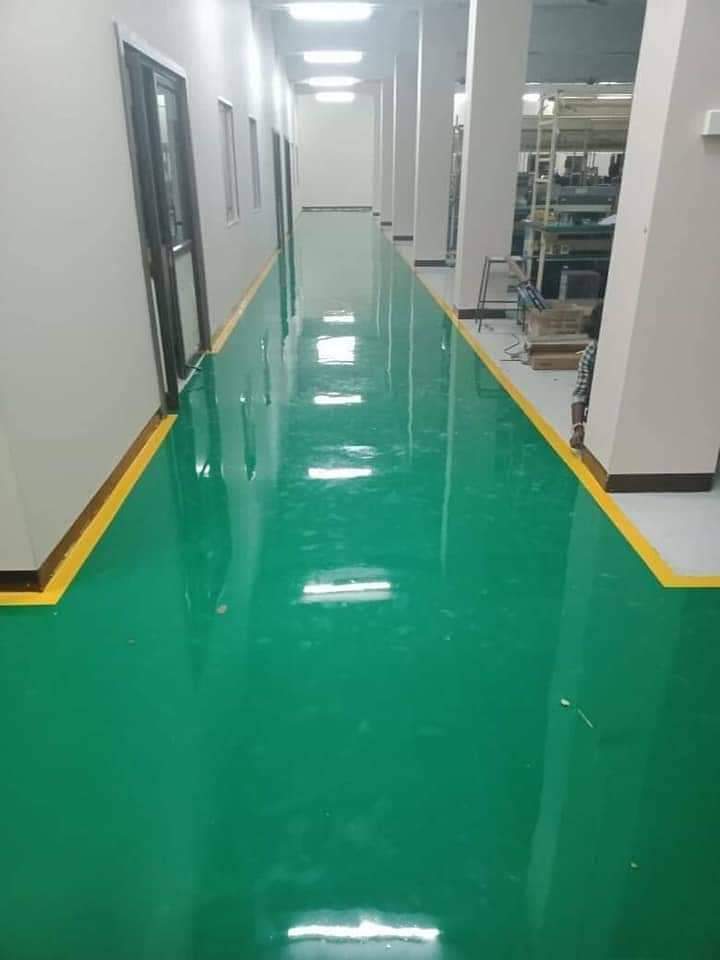The Role of Epoxy in Industrial Flooring Projects
Introduction
Industrial flooring in manufacturing plants, warehouses, and oil and gas facilities faces extreme stress daily. From heavy machinery traffic to exposure to chemicals and oil spills, the surface must remain intact, safe, and functional. That’s where epoxy flooring systems come in. Epoxy has emerged as the go-to solution for robust, long-lasting industrial floors.
In this article, we’ll explore the critical role epoxy plays in industrial flooring projects, from structural benefits to safety enhancements, and why industries across Nigeria trust this material for their facility upgrades.

What is Epoxy Flooring?
Epoxy flooring is a combination of resin and hardener that, when mixed, forms a rigid plastic material. This hardened surface is strong, durable, and resistant to degradation. It bonds exceptionally well to concrete, forming a seamless, smooth finish that withstands wear, chemicals, and heavy loads.
Industries choose epoxy flooring because it provides:
- Exceptional durability
- Slip resistance
- Chemical and oil spill resistance
- Aesthetic appeal (bright, clean finish)
- Easy cleaning and maintenance
Benefits of Epoxy in Industrial Settings
- High Load-Bearing Capacity
Epoxy-coated floors can withstand the weight of forklifts, pallet jacks, and other heavy equipment, making them ideal for warehouses and manufacturing floors. - Chemical Resistance
In sectors like oil and gas, epoxy flooring protects the concrete base from corrosion due to chemical spills, oils, solvents, and acids. - Improved Safety
With anti-slip additives, epoxy floors help prevent workplace accidents due to slips or spills. Custom markings can also be added for traffic lanes and hazard zones. - Cost-Effective Longevity
While the initial installation might seem costly, the reduced maintenance, increased durability, and lower downtime lead to long-term savings. - Hygienic and Easy to Clean
The non-porous, seamless surface prevents dirt and bacteria from accumulating. This is essential in pharmaceutical, food, and beverage industries.
Where Epoxy Flooring is Most Useful
Epoxy’s versatility makes it suitable for:
- Oil and gas plants
- Warehouses
- Pharmaceutical labs
- Aircraft hangars
- Food processing units
- Chemical production sites
If you’re considering epoxy for your facility and wondering where to source reliable materials in Nigeria, check out our detailed guide: Where to Buy Epoxy Flooring Materials in Nigeria.
How Epoxy Flooring Enhances Operational Efficiency
- Reduces Repair Downtime: Less maintenance means minimal disruption to daily operations.
- Boosts Employee Morale: Clean, polished, and safe environments contribute to higher productivity.
- Supports Compliance: Many industries have hygiene and safety standards. Epoxy flooring helps meet them.
Conclusion
The role of epoxy in industrial flooring projects goes beyond aesthetics. It ensures safety, reduces operational costs, and prolongs floor life in demanding environments. For industries looking to invest in durable and efficient flooring solutions, epoxy stands out as a strategic choice.
Looking to start your epoxy flooring project? Contact Epoxy Oilserv Nigeria Limited for expert advice, installation, and top-quality materials tailored to your industry.
